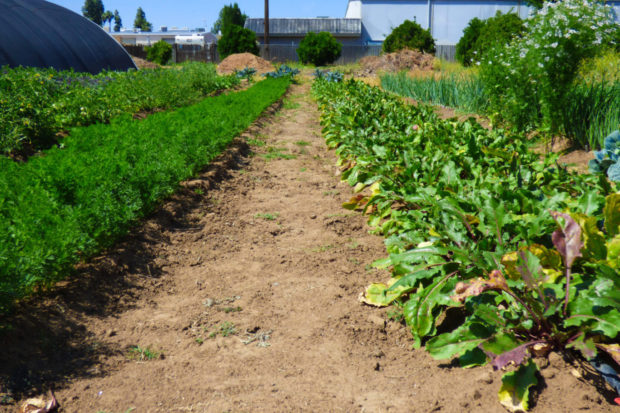
By Ernesto Saavedra
On May 12, the Fresno Environmental Reporting Network (FERN) hosted an Environmental Justice Bus Tour. This was for various nonprofit and government agencies to gain and share knowledge around topics including illegal dumping, pesticides and the drought. There were five stops on this tour: 1) a vacant lot at 9th and Grove in Calwa, 2) Tombstone Territory, 3) Parlier, 4) harvest fields and 5) southwest Fresno. At each stop, we met with residents and professionals to discuss their issues.
Lack of Action, Communication and Coordination
Inundated by environmental hazards, the Environmental Protection Agency ranks Calwa as the second unhealthiest place to live in California. Sandra Celedon-Castro, a public health advocate with Building Healthy Communities and a Calwa resident, affirmed this, “Calwa, 93725 zip code, is the unhealthiest zip code to live in the entire state of California. Not Fresno. The entire state and we follow 93706.”
On 9th and Grove, there were apartments on the lot that later burned down as a result of squatters and the burning of trash. Elvia, a resident of Calwa for 13 years, said the smoke would go everywhere and affected her daughter who has asthma. It wasn’t until 2013 that residents got together and contacted different agencies to do something about it. Now the lot is clean and safe. However, Cesar Campos with the California Environmental Justice Network notes that something could have been done about it a long time ago. “There was an abandoned building, had no real infrastructure in it… there was low coordination between the county and the city as to who was responsible in the area.”
Magdalena Gomez, a regional coordinator with Tenants Together, notes that blighted homes are what spark environmental hazards. “With the Fire Department, they have claimed that 45% of the abandoned homes are a public nuisance… the attention to these arsons has cost the city alone, from a sample that we took from 400 vacant properties, 200–500 thousand dollars in taxpayer money.” She notes that they’ve tried to work with Fresno City Council members but with no luck. At a recent forum to talk specifically about blighted homes, only two Council members showed up. Also, the city’s Blight Task Force has no tenant component and is made up of “realtors, apartment associations, the powerhouses,” according to Gomez.
“Living in a first world country under third world conditions”
Erica lives in Tombstone Territory near the city of Sanger. Her water well has dried up, and she has yet to get any help. “I pay $500 for rent. I have six kids here and no water. I have asked the landlord for help and he hasn’t helped… I have to get water from my neighbors.” Esparza went on to talk about an incident where her whole house smelled like gas. Her kids were getting sick. “The guy [landlord] hasn’t fixed nothing. It’s still the same.”
Leticia Corona, a policy advocate with the Leadership Council for Justice and Accountability, touched on the lack of infrastructure many disadvantaged unincorporated communities face. She noted that there is no lighting, no pavement and many lack connection to the regular sewage system. “Not sure how many of you have been here but people are living in a first world country under third world conditions.” In addition, there are inadequate transit systems. “A trip to the hospital can take a whole day… For one worker getting that whole day off for one 30-minute appointment is really hard.”
Report Environmental Hazards
In response to environmental concerns regarding Maxco Supply Inc., a paper company, residents of Parlier formed a group, the Parlier Fact Finding Committee. Maxco is located next to a neighborhood, and residents of that neighborhood were concerned about plans Maxco had to expand without a permit. They reached out to FERN in early 2014, and after months of negotiations, Maxco and the committee agreed on a plan that included, among many things, a reduction in noise levels at 70 decibels or lower and being in compliance with the San Joaquin Valley Air Pollution Control District.
This was a testament to the power community members have to make sure they are living in a healthy environment despite one’s economic and ethnic background. Healthy living is a right, not a privilege. FERN hopes that these conversations continue and that everyone, especially those living in environmentally hazardous conditions, speak up and report to them. To report a hazard, call/text 559-202-FERN (3376), e-mail reports@fresnoreport.org or visit www.fernreport.org.
*****
Ernesto Saavedra is the editor of the Community Alliance. Contact him at ernesto.fresnoca@gmail.
